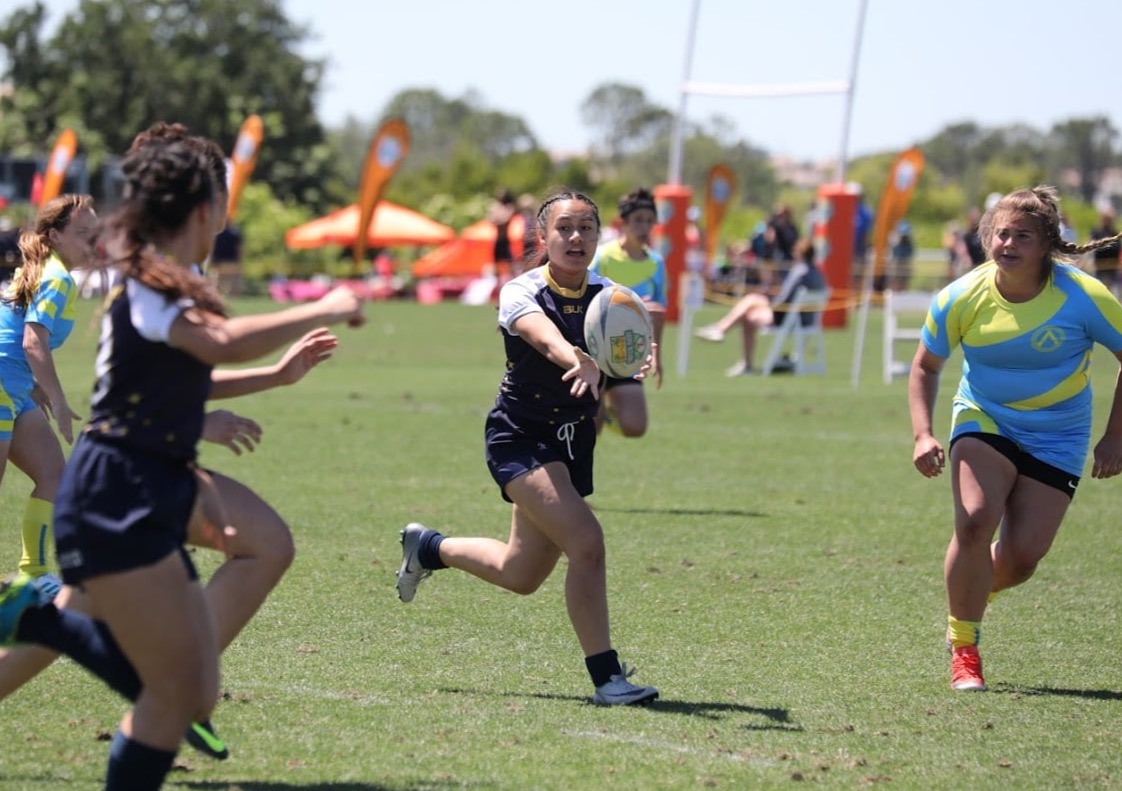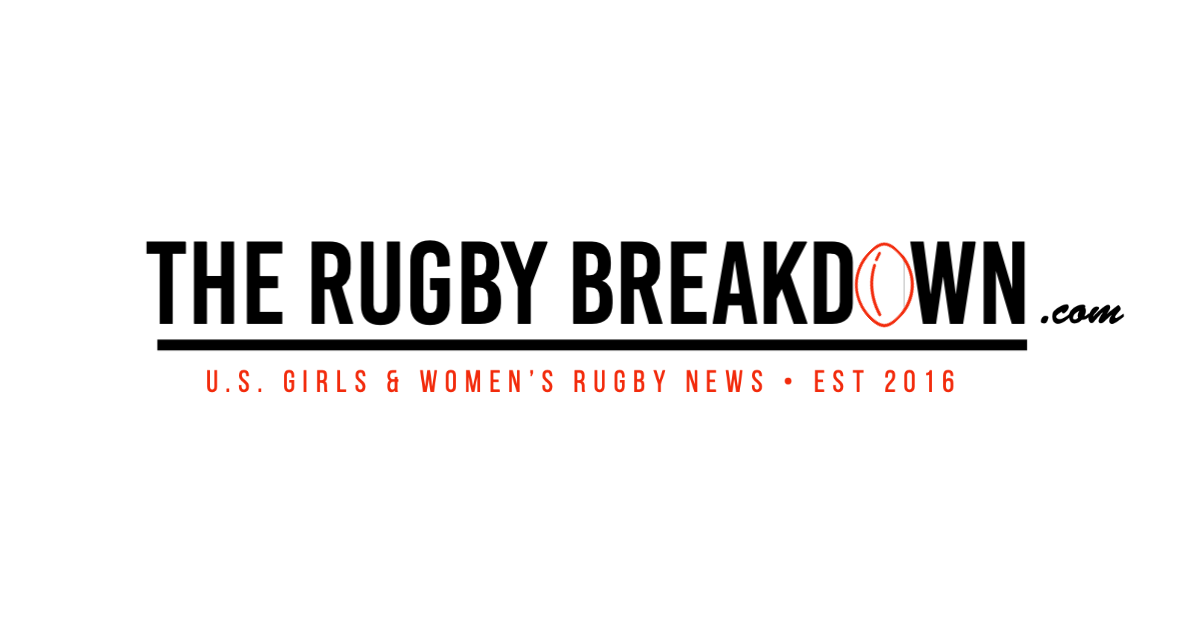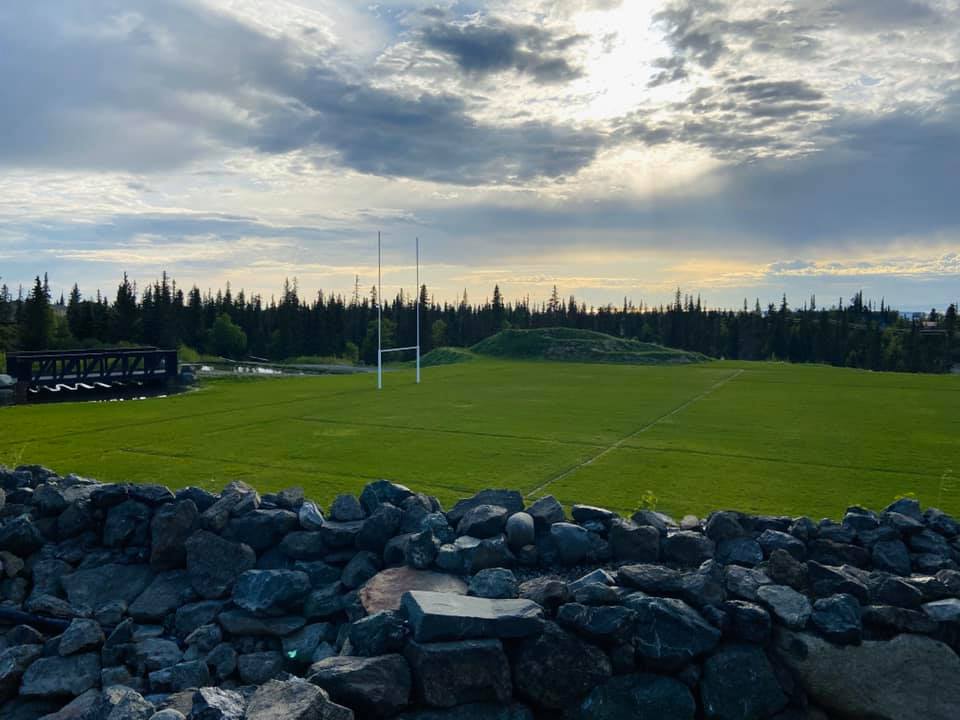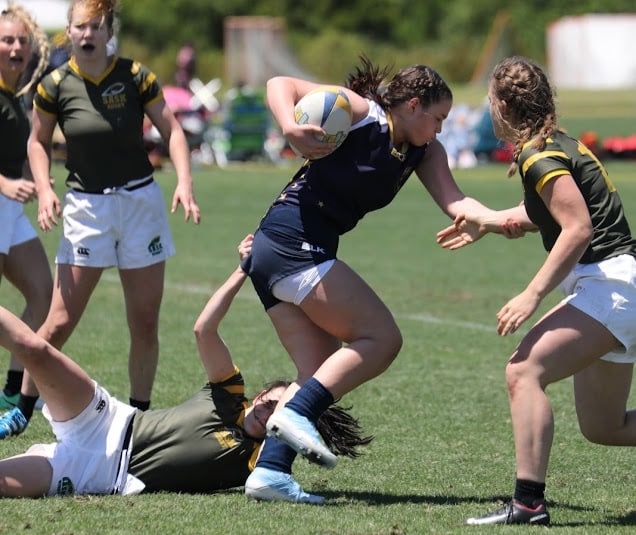
Photo courtesy AKYRC Facebook
The Alaska Youth Rugby Club (AKYRC) saw its primary season (May-August) canceled by Covid-19, but relief arrived in October 2020. The Anchorage-area program shifts to academy mode in the fall, and throughout the winter players train for tours to Las Vegas, Los Angeles, or for 2021, the Tropical 7s in Orlando, Fla. That shot of sunshine will bring on the full-club season, which for the high school girls means 7s round robins every Wednesday night. There’s no “Saturday’s a Rugby Day” at the youth level, because weekends are reserved for families who want to explore The Last Frontier.
Established in 2014, AKYRC now fields U6, U9, U12 co-ed “rippa,” or flag rugby, and then at the U14 level, players have the option to continue with flag or transition to contact. High school girls play 7s, and the membership is divided into four teams based on players’ residences: Eagle River, and North, South and Central Anchorage. On any given competition day, which brings the whole of AKYRC together, 250 kids boot up.
“There was no massive build-up or legacy to build on. Everything’s in its infancy,” AKYRC President David Delozier said of the youth effort. “For the high school girls, we were looking to move toward 10s and then 15s, but we’ve had two crippling events recently. In 2019 it was fire. The air quality index was so bad because the majority of the state was on fire. We couldn’t play because you couldn’t see or breathe. And then Covid hit last summer.”
The Alaska Rugby Academy was allowed to assemble in late October, and Delozier asserted that everyone followed aggressive safety protocols to remain in action. For example, if a player in one of the small training pods showed Covid-19 symptoms, then that player would quarantine and the program would shut down for 14 days.
Delozier explained that only skiing can train outdoors, and with the schools closed, all of those indoor facilities were off limits. Sports clamored for commercial space, “and you got what you got,” Delozier said of Thursday (7-9 p.m.) and Saturday (8-10 a.m.) training slots. “But the players were so stoked. No one’s missed a day.”
When the academy practices started in late October, there were approximately eight players per age group. But as sports like wrestling and basketball shut down, players started recruiting their friends, and now that average is up to 14. The winter academy doesn’t cut players, but there are travel and practice squads.
AKYRC is taking three teams to Tropical 7s in early April: high school boys and girls, and U14 boys. The winter academy is also open to U14 girls, and the one 12-year-old who’s playing is heading to Florida to join a team in need.
Watch for twins Kamryn and Kailyn Tabor. They’ve been with the program for four years and are important leaders. Marlyna Taualii and Ana Faafetai are also influential in the team’s success, as is Grayce O’Farrell, who’s come on in the last couple of years. As for newcomers, take note of 15-year-old Lily Stover. She’s been a Pop Warner lineman and has played with boys her entire sporting career. AKYRC marks her first girls’ team, and she’s loving it.
“She’s an animal, for lack of a better term,” Delozier said. “I hope she stays with it.”
The teams will live-stream their games from Facebook (@AlaskaYouthRugbyClub), a service that has become even more important during the pandemic.
“There’s a limit on the size of a crowd [in Alaska], so parents haven’t been able to watch the practices,” Delozier said. “They drop their kids off with masks on and they walk into the facilities alone. And kids aren’t the best about passing on info:
‘How was practice?’
‘Fun.’
‘What did you learn?’
‘I don’t know, stuff.’
“So, parents haven’t been able to see their kids perform yet. That’s why we’re streaming.”
Delozier reasserted that the team and staff will be following all of the Florida and local safety precautions, but also those mandated by their stricter home state. When they return to Alaska, there will be mandatory testing, etc.
“It’s the upcoming season that’s going to be more of a challenge, because the municipality doesn’t want over 50 people together,” Delozier visualized a traditional competition day in the summer. “During the winter, it was pods of 12 kids and coaches – that’s fine. But the program gets really large in the summer and we’ll have too many numbers.”
May 1 is the annual start date for the regular season, but it’s a moving target even without Covid-19. The snow needs to melt first, and then the municipality issues permits a week later. Then in order to preserve the grass, fields must turn from yellow to green before they can be used. So the season start date has varied by a month in years past. Delozier is hoping that another two months and more guidance from the municipality will dictate the best Return To Play pathway.
“We’re one big club, so all the coaches know each other and there’s no competitive rivalry that you see elsewhere,” Delozier spoke to the collaborative nature of the program. “The only difference is that teams wear differently colored kit – blue, black, yellow, green – so it might be, ‘Hey, we need you to wear a black shirt today,’ and it’s no big deal.”
The four teams practice Monday and Tuesday, and there are round robin games every Wednesday night. The weekends are reserved for exploring the grand state of Alaska.
“There’s adult rugby in other areas like Fairbanks, Juneau, Sitka and on the Kenai Peninsula, so there’s always talk of expanding [youth] there,” Delozier said of mixing up the competition. “But it’s logistics. Fairbanks is seven hours away. So they could form a team but they’d have to build a league.”
Delozier also explained that rugby isn’t affiliated with the high schools themselves, since the main season is in the summer, when school’s out of session. Football starts assembling in July and owns the fall.
“So we can’t connect the dots there,” said Delozier, who is also a football coach. “And I don’t want to compete for players. You want cohesion. In fact, I tell the football coaches: Give me your players during the summer and I’ll return better football players.”
So AKYRC decided to bring the competition to Anchorage.
“The Midnight Sun 7s is an adult tournament that has taken off, and we want the youth level to capitalize on that success,” Delozier said. “We ended up with Last Frontier 7s, and are offering high school girls, high school boys and U14 boys divisions, because those are the ages where we can compete. We want eight clubs per age group and if we can’t do that then we’ll do more of a camp. The Seawolves have already said they’ll do a Wednesday-Thursday camp and then we’ll play Friday-Saturday during that 4th of July weekend.”
The Alaska Rugby Grounds is incentive in and of itself to visit Anchorage, and Delozier rates the facility as the coolest on earth. There are now nine cabins on site that can house four rugby teams, and there’s space for tent camping, too. There’s also on-site cooks, so teams could frame it more like a retreat. And if you’re a referee considering the trip, then definitely the tournament, which prioritizes the luxurious treatment of event referees.
“Our referees come back every year,” said Delozier, who hopes that youth players from around the world start saying the same after the Last Frontier 7s.
For more information on the Last Frontier 7s, visit the Facebook event page or contact tournament director Samuel Pelant at akyouthrugby@gmail.com.





